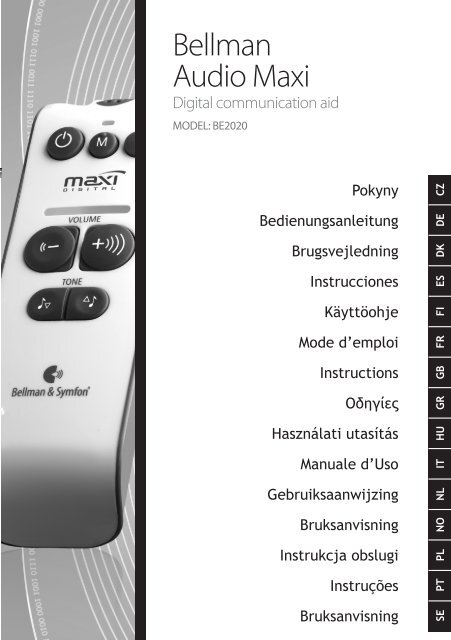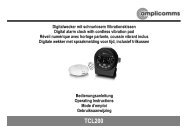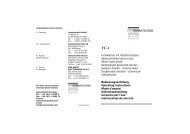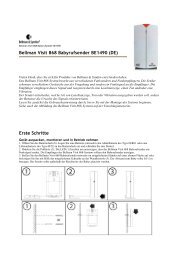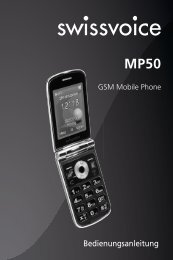Bellman Audio Maxi
Bellman Audio Maxi
Bellman Audio Maxi
You also want an ePaper? Increase the reach of your titles
YUMPU automatically turns print PDFs into web optimized ePapers that Google loves.
<strong>Bellman</strong><br />
<strong>Audio</strong> <strong>Maxi</strong><br />
Digital communication aid<br />
MODEL: BE2020<br />
Pokyny<br />
Bedienungsanleitung<br />
Brugsvejledning<br />
Instrucciones<br />
Käyttöohje<br />
Mode d’emploi<br />
Instructions<br />
Οδηγίες<br />
Használati utasítás<br />
Manuale d’Uso<br />
Gebruiksaanwijzing<br />
Bruksanvisning<br />
Instrukcja obslugi<br />
Instruções<br />
Bruksanvisning<br />
CZ<br />
DE<br />
DK<br />
ES<br />
FI<br />
FR<br />
GB<br />
GR<br />
HU<br />
IT<br />
NL<br />
NO<br />
PL<br />
PT<br />
SE
Other listening accessories with<br />
3,5 mm teleplug connector<br />
BE9124<br />
ear phones<br />
BE1360<br />
<strong>Bellman</strong> Scart<br />
<strong>Audio</strong> Switch<br />
BE9125<br />
Steto clips<br />
3,5 mm<br />
stereo<br />
telejack<br />
BE9128<br />
Neck loop<br />
<strong>Audio</strong> sources with<br />
headphone output ( 3,5<br />
mm telejack connector)<br />
2,5 mm mono<br />
teleplug<br />
2,5 mm<br />
mono<br />
teleplug<br />
BE9122<br />
Stereo<br />
headphones<br />
<strong>Audio</strong> sources with line<br />
levels (RCA phono connector)<br />
3,5 mm stereo telejack 2,5 mm stereo teleplug<br />
5m<br />
BE9126<br />
Cable kit<br />
5m<br />
BE9127<br />
Ext. mic
<strong>Bellman</strong> ®<br />
<strong>Audio</strong> <strong>Maxi</strong><br />
Digital communication aid<br />
For use in all EU countries<br />
Hereby, <strong>Bellman</strong> & Symfon AB, declares that this BE2020 is in compliance with the<br />
essential requirements and other relevant provisions of<br />
directives: EMC 1989/336/EC.<br />
Correct use and disposal of batteries:<br />
Replace only with the same or equivalent type recommended by the manufacturer.<br />
Please dispose of old, defective batteries in an environmentally friendly manner in<br />
accordance with the relevant legislation.
Digitale Hörhilfe <strong>Bellman</strong> <strong>Audio</strong> <strong>Maxi</strong>, BE2020<br />
Vielen Dank, dass Sie sich für Produkte von <strong>Bellman</strong> & Symfon entschieden haben.<br />
<strong>Bellman</strong> <strong>Audio</strong> ist ein System von Hörhilfen. Das System besteht aus einer Reihe von Einheiten,<br />
die in verschiedenen Situationen eine Verbesserung der Hörverhältnisse ermöglichen. Die<br />
<strong>Bellman</strong> <strong>Audio</strong>-Produkte erleichtern vielen Menschen den Alltag und geben ihnen die Freiheit,<br />
ihren Interessen ungehindert nachzugehen.<br />
Lesen Sie zuerst die Gebrauchsanweisung durch, bevor Sie das Produkt in Betrieb nehmen.<br />
Beachten Sie die Abbildung des Zubehörs und der Anschlussmöglichkeiten auf der<br />
Umschlaginnenseite.<br />
Erste Schritte<br />
Gerät auspacken, montieren und in Betrieb nehmen<br />
1. Öffnen Sie das Batteriefach (17), indem Sie den Riegel des Batteriefachdeckels (1 ) in<br />
Pfeilrichtung drücken. Legen Sie die Batterien ein und achten Sie darauf, dass sie richtig<br />
herum eingesetzt sind. Beachten Sie die Markierungen im Batteriefach (14). Verwenden<br />
Sie nur Alkalibatterien des Typs AA. Drücken Sie die Batterien nicht mit Gewalt in das<br />
Fach. Schließen Sie das Batteriefach (17) und stellen Sie sicher, dass der Riegel (1 ) mit<br />
einem Klicken einrastet.<br />
2. Schließen Sie einen <strong>Bellman</strong> Stereokopfhörer BE9122, eine <strong>Bellman</strong> Halsschleife<br />
BE9128, einen <strong>Bellman</strong> Stetoclip BE9125, einen <strong>Bellman</strong> Ohrhörer BE9124 oder ein<br />
anderes von <strong>Bellman</strong> & Symfon empfohlenes Produkt am grünen Kopfhörerausgang (12)<br />
auf der rechten Seite an.<br />
3. Drücken Sie kurz auf die Ein/Aus-Taste h (5), um den <strong>Maxi</strong> zu starten. Die LEDs (3 und<br />
4) über der Taste für das Mikrofon a ( ) und der Taste für die Telespule d (7) blinken,<br />
während der <strong>Maxi</strong> gestartet wird.<br />
4. Beim Starten des Geräts ist immer das interne Mikrofon (2) als Schallquelle ausgewählt.<br />
Außerdem wird der Lautstärkeregler auf eine niedrige Lautstärke eingestellt, um<br />
unangenehme Schallpegel zu vermeiden.<br />
5. Sie können die Lautstärke mithilfe des Lautstärkereglers bc (9) einstellen. Durch c wird<br />
die Lautstärke angehoben, durch b wird sie gesenkt. Die Leuchtanzeige für Lautstärke<br />
und Klang (8) gibt die Lautstärke an. Je mehr LEDs leuchten, desto höher ist die<br />
Lautstärke. Die Leuchtanzeige erlischt 3 Sekunden nach dem Einstellen der Lautstärke.<br />
. Sie können den Klang mithilfe des Klangreglers fg (10) einstellen. Durch g wird der<br />
Höhenpegel angehoben, durch f wird er gesenkt. Die Leuchtanzeige für Lautstärke und<br />
Klang (8) zeigt die Klangeinstellung an. Die Leuchtanzeige erlischt 3 Sekunden nach dem<br />
Einstellen des Klangs.<br />
7. Wenn Sie fertig sind, können Sie den <strong>Maxi</strong> ausschalten, indem Sie kurz auf die Ein/Aus-<br />
Taste h (5) drücken.<br />
Funktion<br />
Die Digitale Hörhilfe <strong>Bellman</strong> <strong>Audio</strong> <strong>Maxi</strong>, BE2020, ist ein digitaler Gesprächsverstärker, der<br />
speziell für eine außergewöhnliche Hörqualität selbst in schwierigen Situationen entwickelt
wurde. Der <strong>Maxi</strong> eignet sich ausgezeichnet sowohl für Gespräche als auch für Musik und kann<br />
entweder mit dem eingebauten Mikrofon, einem externen Mikrofon (Zubehör) oder anderen<br />
externen Schallquellen verwendet werden.<br />
Eingebautes Mikrofon<br />
Das eingebaute Mikrofon (2) ist unter der Gummikappe oben an der Frontblende<br />
angebracht.<br />
Es handelt sich um ein omnidirektionales Mikrofon (ungerichtet).<br />
Telespule<br />
Die eingebaute Telespule ist um 45 Grad abgewinkelt, um induktive Signale von einer<br />
Teleschleife sowohl in horizontaler Lage (in der Hand oder auf einem Tisch) als auch in<br />
vertikaler Lage (in einem Clip oder Umhängeriemen) erfassen zu können.<br />
Der T-Modus kann in Räumen verwendet werden, in denen eine Teleschleife (oder Hörschleife)<br />
installiert ist. Suchen Sie nach dem entsprechenden Symbol oder erkundigen Sie sich beim<br />
Personal, ob eine Teleschleife installiert ist.<br />
Signalquelle auswählen<br />
Die Auswahl der Schallquelle ist ganz einfach.<br />
• Sie können entweder das interne Mikrofon (M-Modus) oder die eingebaute Telespule<br />
(T-Modus) auswählen, indem Sie die Tasten a ( ) und d (7) an der Frontblende drücken.<br />
Beim Wechsel zwischen diesen Modi wird der Lautstärkeregler auf einen niedrigen Pegel<br />
eingestellt, um unangenehme Schallpegel zu vermeiden.<br />
• Wird ein Gerät an den Eingang für eine externe Schallquelle angeschlossen, wird dieses<br />
automatisch vom <strong>Maxi</strong> ausgewählt. Wird die Verbindung zum Gerät wieder getrennt,<br />
wechselt <strong>Maxi</strong> automatisch zum internen Mikrofon (M-Modus).<br />
Externe Schallquelle<br />
Wenn Sie den roten 2,5-mm-Klinkenstecker über ein <strong>Audio</strong>kabel (Zubehör BE912 ) mit einer<br />
Schallquelle (SCART-Schalter, HiFi-Anlage, MP3-Player etc.) verbinden, wird stattdessen<br />
diese Schallquelle ausgewählt. Die Eingangsempfindlichkeit wird automatisch reguliert, um<br />
die Signalstärke für diese Schallquellen anzupassen. Das interne Mikrofon (2) wird in diesem<br />
Modus ausgeschaltet.<br />
Kombinierte Signalquellen<br />
Wurde eine Schallquelle an den Eingang für eine externe Schallquelle (1) angeschlossen, kann<br />
diese Schallquelle mit dem Signal kombiniert werden, das vom internen Mikrofon (2) erfasst<br />
wird. Halten Sie hierfür die a-Taste ( ) gedrückt.<br />
Die Lautstärke der Schallquelle, die am Eingang für eine externe Schallquelle (1) angeschlossen<br />
ist, wird gesenkt, und das interne Mikrofon wird zugeschaltet, sodass man z. B. Geräusche<br />
wahrnehmen oder sich mit einer anderen Person unterhalten kann. Die LED für das Mikrofon<br />
(3) blinkt, während die Taste gedrückt gehalten wird.<br />
Um zu der Signalquelle zurückzukehren, die an den Eingang für eine externe Schallquelle (1)<br />
angeschlossen ist, lassen Sie die a-Taste ( ) los. Dann wird das interne Mikrofon ausgeschaltet<br />
und die externe Schallquelle kehrt zur normalen Lautstärke zurück.<br />
7
8<br />
Clip<br />
Legen Sie den Clip am Batteriefach an und drücken Sie ihn fest, sodass er zuschnappt.<br />
Sie können den Clip abnehmen, indem Sie die kleinen Griffe von der Seite herausdrücken.<br />
Anzeigen und Einstellungen<br />
Leuchtanzeige für Lautstärke und Klang<br />
Die Leuchtanzeige für Lautstärke und Klang (8) dient u. a. zur Anzeige der Lautstärken- und<br />
Klangeinstellung.<br />
Um Strom zu sparen, erlischt die Leuchtanzeige für Lautstärke und Klang nach ca. 3 Sekunden.<br />
LED für niedrigen Batteriestand<br />
Die LED für niedrigen Batteriestand (11) ist normalerweise ausgeschaltet und leuchtet erst<br />
dann auf, wenn noch eine Betriebsdauer von ca. 10 Stunden verbleibt. Diese Zeit hängt<br />
natürlich von der Lautstärke sowie von der Art des verwendeten Zubehörs ab.<br />
Wenn die LED für niedrigen Batteriestand (11) alle sieben Sekunden blinkt, müssen die<br />
Batterien erneuert werden. Verwenden Sie nur Alkalibatterien des Typs AA.<br />
Lautstärkeregler<br />
<strong>Maxi</strong> verfügt über einen digitalen Lautstärkeregler bc (9), d. h. Sie können mithilfe der Tasten<br />
bc (9) die Lautstärke anheben oder senken. Bei jedem Drücken wird die Lautstärke um einen<br />
Schritt angehoben bzw. gesenkt.<br />
Wird eine der Lautstärkentasten länger als eine 1 Sekunde gedrückt gehalten, wird die<br />
Lautstärke so lange um einen Schritt pro Sekunde erhöht bzw. verringert, wie die Taste
gedrückt gehalten wird, oder bis der niedrigste bzw. höchste Pegel erreicht ist.<br />
Durch Drücken der c-Taste (9) wird die Lautstärke um jeweils einen Schritt erhöht, bis<br />
die maximale Lautstärke erreicht ist. Bei voller Lautstärke leuchten alle LEDs in der<br />
Leuchtanzeige für Lautstärke und Klang (8).<br />
Durch Drücken der b-Taste (9) wird die Lautstärke um jeweils einen Schritt verringert, bis<br />
die niedrigste Lautstärke erreicht ist. Es wird jedoch nie völlig still. Bei niedrigster Lautstärke<br />
leuchtet nur die linke LED in der Leuchtanzeige für Lautstärke und Klang (8).<br />
Klangregler<br />
Der BE2020 verfügt über einen digitalen Klangregler fg (10), d. h. Sie können mithilfe<br />
der Tasten fg (10) den Höhenpegel anheben oder senken. Bei jedem Drücken wird der<br />
Höhenpegel um einen Schritt angehoben bzw. gesenkt.<br />
Wird eine der Klangtasten länger als eine 1 Sekunde gedrückt gehalten, wird der Klangpegel<br />
so lange um einen Schritt pro Sekunde erhöht bzw. verringert, wie die Taste gedrückt gehalten<br />
wird, oder bis der niedrigste bzw. höchste Pegel erreicht ist.<br />
Durch Drücken der g-Taste (10) wird der Höhenpegel um jeweils einen Schritt erhöht, bis der<br />
höchste Pegel erreicht ist. Bei maximalem Höhenpegel leuchtet die LED ganz rechts in der<br />
Leuchtanzeige für Lautstärke und Klang (8).<br />
Durch Drücken der f-Taste (10) wird der Höhenpegel um jeweils einen Schritt verringert, bis<br />
der niedrigste Pegel erreicht ist. Bei niedrigstem Höhenpegel leuchtet die LED ganz links in der<br />
Leuchtanzeige für Lautstärke und Klang (8).<br />
Leuchtet die mittlere LED in der Leuchtanzeige für Lautstärke und Klang (8), ist der<br />
Höhenpegel unverändert.<br />
Fehlersuche (Kurzübersicht)<br />
Symptom Maßnahme<br />
Nichts geschieht, wenn man versucht, den<br />
<strong>Maxi</strong> mit der Ein/Aus-Taste zu starten.<br />
Über die Kopfhörer ist kein Ton zu hören,<br />
wenn der <strong>Maxi</strong> eingeschaltet ist.<br />
• Batterie wechseln. Verwenden Sie nur<br />
Alkalibatterien des Typs AA.<br />
• Sicherstellen, dass die richtige Signalquelle<br />
gewählt ist, z. B. das interne<br />
Mikrofon (M-Modus).<br />
Nähere Informationen zu diesem Produkt auf Englisch finden Sie im Anhang.<br />
1. Eingang für externe Schallquelle,<br />
2,5-mm-Klinkenstecker<br />
2. Internes Mikrofon<br />
3. LED für das Mikrofon<br />
4. LED für die Telespule<br />
5. Ein/Aus-Taste h<br />
. Taste zur Auswahl des Mikrofons a<br />
7. Taste zur Auswahl der Telespule d<br />
8. Leuchtanzeige für Lautstärke und<br />
Klang<br />
9. Lautstärkeregler bc<br />
10. Klangregler fg<br />
11. LED für niedrigen Batteriestand<br />
12. Kopfhörerausgang, 3,5-mm-<br />
Klinkenstecker<br />
13. Befestigung für Umhängeriemen<br />
14. Batteriefach<br />
15. Einstelltaste<br />
1 . Riegel des Batteriefachdeckels<br />
17. Batteriefachdeckel<br />
18. Klemme / Clip<br />
9
30<br />
<strong>Bellman</strong> <strong>Audio</strong> <strong>Maxi</strong> Digital Communication Aid, BE2020<br />
Thank you for choosing products from <strong>Bellman</strong> & Symfon.<br />
<strong>Bellman</strong> <strong>Audio</strong> is an assistive listening system. The system consists of a number of units which<br />
facilitate listening under different circumstances. <strong>Bellman</strong> <strong>Audio</strong> products make everyday life<br />
easier for many people and give them the freedom to freely pursue their interests.<br />
Read through the entire user manual first before starting to use the product.<br />
Refer to the diagram showing the accessories and connection options on the inside of the cover.<br />
Getting started<br />
Unpacking, installing and testing the unit<br />
1. Open the battery cover (17) by pressing the battery cover lock (16) in the direction of the<br />
arrow. Fit the batteries and make sure they have been inserted the right way round. Follow<br />
the markings in the battery compartment (14). Only use AA alkaline type batteries. Do not<br />
use force to press down the batteries. Close the battery cover (17) and check that the lock<br />
(16) locks with a click.<br />
2. Connect BE9122 <strong>Bellman</strong> Headphones, BE9128 <strong>Bellman</strong> Neck Loop, BE9125 <strong>Bellman</strong><br />
Stetoclip, BE9124 <strong>Bellman</strong> Ear Phones or another product recommended by <strong>Bellman</strong> &<br />
Symfon to the green headphone output (12) on the right-hand side.<br />
3. Give one short press on the On/Off button h (5) to start <strong>Maxi</strong>. The LEDs (3 and 4) above<br />
the Microphone selection button a (6) and the Telecoil selection button d (7) will blink<br />
while <strong>Maxi</strong> starts.<br />
4. <strong>Maxi</strong> always starts with the internal microphone (2) selected as a sound source. In addition,<br />
the volume control is always set to low volume to avoid unpleasant sound levels.<br />
5. Use the volume control bc (9) to control the sound level. c increases and b reduces the<br />
volume. The Volume and Tone LED Indicator (8) shows the sound level. The more LEDs<br />
that are lit the higher the volume. The LED indicator goes out 3 seconds after the sound<br />
volume has been set.<br />
6. Use the tone control fg (10) to adjust the sound quality. g increases and f reduces the<br />
treble. The Volume and Tone LED Indicator (8) shows the tone setting. The LED indicator<br />
goes out 3 seconds after the sound quality has been set.<br />
7. When you have finished, you can switch off <strong>Maxi</strong> by giving a short press on the On/Off<br />
button h (5).<br />
Function<br />
The BE2020 <strong>Bellman</strong> <strong>Audio</strong> <strong>Maxi</strong> Digital Communication Aid is a digital amplifier which has<br />
been specifically developed to provide an exceptional sound experience even in demanding<br />
situations. <strong>Maxi</strong> works extremely well for speech and music with the built-in microphone, with an<br />
external microphone (accessory) or with other external sound sources.<br />
Built-in microphone<br />
The built-in microphone (2) is located under the rubber cap on the top of the front panel.<br />
The microphone is an omnidirectional one.
Telecoil<br />
The built-in telecoil is angled at 45 degrees in order to catch inductive signals from an inductive<br />
loop in both the horizontal position (in the hand or on a table) and vertical position (on a clip or<br />
neck strap).<br />
The T position can be used in premises where an inductive loop (or hearing loop)<br />
has been fitted. Look for the inductive loop symbol or ask staff whether there is an<br />
inductive loop if you are unsure.<br />
Selecting the signal source<br />
It is easy to select the sound source.<br />
• The user can manually choose between the internal microphone (M position) or built-in<br />
telecoil (T position) by pressing the buttons a (6) and d (7) on the front. When switching<br />
between these, the volume control will be set to a low level to avoid unpleasant sound levels.<br />
• If something is connected to the external sound source input, <strong>Maxi</strong> automatically selects<br />
this. When you remove it, <strong>Maxi</strong> is automatically connected to the internal microphone (M<br />
position).<br />
External sound source<br />
If the user connects an audio cable (accessory BE9126) between the red 2.5 mm tele jack and<br />
a sound source (SCART connector, hi-fi equipment, MP3 player etc.), this sound source is<br />
selected instead. The input sensitivity is automatically adjusted to adjust the signal strength to<br />
these sound sources. The internal microphone (2) is switched off in this position.<br />
Combined signal sources<br />
When you have connected a sound source to the External sound source input (1), this sound<br />
source can be combined with the sound that the internal microphone (2) receives. This is done<br />
by holding down the a button (6).<br />
The sound from the sound source connected to the External sound source input (1) is reduced<br />
and the internal microphone is connected so that you can, for example, perceive sound or<br />
converse with somebody else. The Microphone LED (3) blinks while the button is held down.<br />
When you want to return to listening to the signal source connected to the External sound<br />
source input (1), release the a button (6). The internal microphone is then disconnected and the<br />
external sound source returns to normal volume again.<br />
Clip<br />
Place the clip against the battery cover and press firmly so that it locks on.<br />
31
32<br />
Remove the clip by using the small round handles and pressing out from the sides.<br />
Indicators and settings<br />
Volume and Tone LED Indicator<br />
The Volume and Tone LED Indicator (8) is used as an indicator for the volume and tone<br />
controls.<br />
The Volume and Tone LED Indicator goes out after about 3 seconds to save power.<br />
Low battery LED<br />
The Low battery LED (11) is normally off, but comes on when the battery level falls below<br />
about 10 hours’ remaining operating time. This time depends, of course, on the sound volume<br />
and type of listening accessories used.<br />
When the Low battery LED (11) blinks every seven seconds, the batteries should be replaced<br />
with new ones. Only use AA alkaline type batteries.<br />
Volume control<br />
<strong>Maxi</strong> has a digital volume control bc (9), which means that you can increase or reduce the<br />
volume with the pushbuttons bc (9). Each press results in an increase or reduction in volume<br />
by one increment.<br />
If you hold one of the volume buttons down for more than 1 second, the volume will increase or<br />
reduce by one increment per second as long as the button is held down or until the minimum or<br />
maximum position is reached.<br />
By pressing the c button (9), the volume is increased by one increment at a time until the<br />
maximum volume is reached. At full volume all the LEDs of the Volume and Tone LED<br />
Indicator (8) are illuminated.<br />
By pressing the b button (9), the volume is reduced by one increment at a time until the<br />
minimum volume is reached, although <strong>Maxi</strong> never becomes totally silent. At minimum volume<br />
only the left LED of the Volume and Tone LED Indicator (8) is illuminated.
Tone control<br />
BE2020 has a digital tone control fg (10), which means that you can increase or reduce the<br />
treble with the pushbuttons fg (10). Each press results in an increase or reduction in treble by<br />
one increment.<br />
If you hold one of the tone buttons down for more than 1 second, the treble will increase or<br />
reduce by one increment per second as long as the button is held down or until the minimum or<br />
maximum position is reached.<br />
By pressing the g button (10), the treble is increased by one increment at a time until<br />
maximum treble is reached. At maximum treble, the LED at the far right of the Volume and<br />
Tone LED Indicator (8) is illuminated.<br />
By pressing the f button (10), the treble is reduced by one increment at a time until minimum<br />
treble is reached. At minimum treble, the LED at the far left of the Volume and Tone LED<br />
Indicator (8) is illuminated.<br />
When the centre LED of the Volume and Tone LED Indicator (8) is illuminated, treble is<br />
deactivated.<br />
Troubleshooting in brief<br />
Symptom Solution<br />
Nothing happens when you try to start <strong>Maxi</strong><br />
using the On/Off button.<br />
No sound can be heard in the headphones<br />
when <strong>Maxi</strong> is switched on.<br />
• Change the batteries. Only use AA alkaline<br />
type batteries.<br />
• Check that the correct signal source has<br />
been selected, e.g. internal microphone<br />
(M position).<br />
For further information about the product in English, refer to the Appendix.<br />
1. External sound source input 2.5 mm tele jack<br />
2. Internal microphone<br />
3. Microphone LED<br />
4. Telecoil LED<br />
5. On/Off button h<br />
6. Microphone Selection Button a<br />
7. Telecoil Selection Button d<br />
8. Volume and Tone LED Indicator<br />
9. Volume control bc<br />
10. Tone control fg<br />
11. Low battery LED<br />
12. Headphone output 3.5 mm tele jack<br />
13. Neck strap attachment<br />
14. Battery cover<br />
15. Setting button<br />
16. Battery cover lock<br />
17. Battery cover<br />
18. Clip<br />
33
Appendix<br />
Connection<br />
Normally when you use <strong>Bellman</strong> <strong>Audio</strong> <strong>Maxi</strong> digital communication aid, you place it on a table, hold it in<br />
your hand, hang it round your neck using a neck strap (accessory) or attach it to an article of clothing with<br />
the clip supplied (18).<br />
You can connect BE9122 <strong>Bellman</strong> <strong>Audio</strong> Headphones, BE9128 <strong>Bellman</strong> <strong>Audio</strong> Neck Loop, BE9125<br />
<strong>Bellman</strong> <strong>Audio</strong> Stetoclips, BE9124 <strong>Bellman</strong> <strong>Audio</strong> Ear Phones or another product recommended by<br />
<strong>Bellman</strong> & Symfon to the Headphone Output (12).<br />
You can connect a BE9126 <strong>Bellman</strong> <strong>Audio</strong> Cable Kit to the External Sound Source Input (1), which you<br />
can connect to the required sound source or a BE9127 <strong>Bellman</strong> <strong>Audio</strong> External Microphone. It has a 5<br />
metre long cable so that it can, for example, be positioned next to the TV or someone who is speaking.<br />
Press on the On/Off button h (5) to start <strong>Maxi</strong>. While <strong>Maxi</strong> is starting up, the Microphone LED (3) and<br />
the Telecoil LED (4) blinks. When the Microphone LED (3) comes on, <strong>Maxi</strong> is ready to use and you will<br />
hear sound from the internal microphone in the headphones.<br />
Please note: The BE2020 <strong>Bellman</strong> <strong>Audio</strong> <strong>Maxi</strong> digital communication aid is not a hearing instrument.<br />
<strong>Bellman</strong> & Symfon AB recommend that anyone who is experiencing hearing loss should consult a doctor.<br />
Warning! The BE2020 <strong>Bellman</strong> <strong>Audio</strong> <strong>Maxi</strong> digital communication aid has a very powerful amplifier<br />
and the sound level can cause discomfort or, in serious cases, endanger hearing if the product is used<br />
carelessly. Always turn the volume down to a low level before putting on the headphones!<br />
Warning! If the BE2020 <strong>Bellman</strong> <strong>Audio</strong> <strong>Maxi</strong> digital communication aid is used together with a neck<br />
loop, e.g. BE9128 (accessory), the inductive loop (T position) should not be selected as a signal source,<br />
because this can cause powerful inductive feedback. Feedback together with a high sound level can cause<br />
discomfort or, in serious cases, endanger your hearing.<br />
Settings<br />
<strong>Bellman</strong> <strong>Audio</strong> <strong>Maxi</strong> has more setting options than those found on the front. You can adjust and adapt<br />
<strong>Maxi</strong> to your individual requirements using the Setting button (15).<br />
Balance<br />
The balance between the right and left channels can be set, e.g. for headphones. This setting can be used to<br />
compensate for a hearing loss in one ear.<br />
The standard setting is centred balance.<br />
All settings are carried out in sequence, see below under Adjusting settings.<br />
Basic attenuation<br />
The basic attenuation can be set, for example, for different headphones. What you actually set is the<br />
attenuation you require at the maximum power output you want to have (which is therefore 0 dB<br />
attenuation). This setting is useful when you want to adjust the maximum volume for a pair of headphones<br />
or in-ear phones with a higher sensitivity than the BE9122 <strong>Bellman</strong> <strong>Audio</strong> Headphones.<br />
The standard setting is 0 dB attenuation.<br />
All settings are carried out in sequence, see below under Adjusting settings.
Blocking the T position<br />
The Telecoil Selection Button can be blocked if you know that the T position will not be used. This setting<br />
is for those who will never use the Telecoil and want to avoid selecting this position by mistake.<br />
The standard setting is for blocking of the T position not to be activated.<br />
All settings are carried out in sequence, see below under Adjusting settings.<br />
Adjusting settings<br />
It is easy to adjust settings.<br />
• Open the battery cover (17) by pressing the<br />
battery cover lock (16) in the direction of the<br />
arrow.<br />
• Press the Setting button (15) for about 5<br />
seconds. It is easiest to do this with a paper<br />
clip, see figure. One of the LEDs in the<br />
Volume and Tone LED Indicator (8) now<br />
starts to blink<br />
• Adjust the balance between the right and<br />
left channels using the volume control bc<br />
(9). c moves the sound towards the right<br />
channel and b moves the sound towards the<br />
left channel. The current setting is indicated<br />
by a flashing dot on the Volume and Tone LED Indicator (8) which moves towards the right or left.<br />
When the desired value has been set, give a short press on the Setting button (15) and <strong>Maxi</strong> will move<br />
on to setting the maximum volume.<br />
• Adjust the maximum volume using the volume control bc (9). c increases the maximum volume<br />
and b reduces the maximum volume. The current attenuation setting relative to the maximum volume<br />
is displayed via the Volume and Tone LED Indicator (8). No attenuation is shown by only one LED<br />
being visible at the right. The greater the attenuation the more LEDs come on from right to left. Each<br />
increment and hence each lit LED corresponds to a reduction of 3 dB.<br />
When the desired value has been set, give a short press on the Setting button (15) and <strong>Maxi</strong> will move<br />
on to the setting for locking the T position.<br />
• Now set the use of the telecoil to locked or unlocked using the volume control bc (9). c enables use<br />
of the telecoil and b blocks use of the telecoil. When the telecoil is activated, the Telecoil LED (4)<br />
blinks and when the function is blocked the Telecoil LED (4) is off.<br />
• When the desired value has been set, there are three options:<br />
o To start again: give a short press on the Setting button (15) and <strong>Maxi</strong> starts again with<br />
setting the balance above.<br />
o To save: press the Setting button (15) for about 5 seconds and <strong>Maxi</strong> saves the settings that<br />
have been adjusted and returns to normal mode.<br />
o To change your mind: press the On/Off button h (5) and <strong>Maxi</strong> will disregard all the<br />
settings that have been adjusted and return to normal mode.<br />
+<br />
_<br />
_<br />
+
Testing<br />
It is easy to test the <strong>Bellman</strong> <strong>Audio</strong> <strong>Maxi</strong> digital communication aid for yourself. If <strong>Maxi</strong> is not working as<br />
described below, you can carry out further troubleshooting as instructed in the section Troubleshooting/<br />
Troubleshooting guide.<br />
How to test<br />
The internal microphone and telecoil can be tested by connecting BE9122 <strong>Bellman</strong> <strong>Audio</strong> Headphones to<br />
the Headphone output (12) and then selecting the Internal microphone (2) using the Microphone Selection<br />
Button a (6) or the Telecoil Selection Button d (7).<br />
The External sound source input (1) can be tested by connecting a CD player or a radio to the input via an<br />
audio cable. Switching to the External signal source input (1) takes place automatically when the connector<br />
is connected to the External sound source input (1) on <strong>Maxi</strong>.<br />
Troubleshooting<br />
You can carry out a number of checks yourself before sending a product for repair.<br />
Troubleshooting guide<br />
Symptom Solution<br />
Nothing happens when you try to start <strong>Maxi</strong> using the<br />
On/Off button.<br />
No sound can be heard in the headphones when <strong>Maxi</strong> is<br />
switched on.<br />
• Check that the batteries have been<br />
inserted the right way round.<br />
• Change the batteries. Only use AA<br />
alkaline type batteries.<br />
• Check that the correct signal source has<br />
been selected, e.g. internal microphone (M<br />
position).<br />
• Check that the headphone plug is securely<br />
inserted in the headphone output.<br />
• Connect the headphones to another sound<br />
source (with a 3.5 mm headphone output)<br />
to test the headphones.<br />
A high-pitched noise is heard in the headphones. • Lower the volume or increase the distance<br />
between <strong>Maxi</strong> and the headphones.<br />
• Direct the microphone away from you.<br />
Technical information<br />
Power supply<br />
Battery power: Two 1.5 V AA alkaline type batteries<br />
Operating time: 100 - 150 hours depending on the load and sound pressure<br />
Power consumption: 17 mA (120 mA max)<br />
Input signals<br />
Microphone: Built-in microphone (omnidirectional)<br />
Telecoil: Built-in telecoil (angled at 45°)<br />
External sound source input: 2.5 mm stereo jack plug (0 dBV max input signal)
Output signals<br />
Headphone socket: 3.5 mm stereo jack plug<br />
Output signal: 117.67 dB @ 1 kHz (SPL90)<br />
119.52 dB (HF Ave. SPL90), with BE9122 Stereo Headphones<br />
Amplification: 29.21 dB (Ref. test gain SPL70)<br />
Distortion: 0.559% THD (electrical)<br />
Frequency range: 300 - 10000 (+/- 5 dB, flat)<br />
Tone control: +/- 10 dB<br />
Output power: max 125 mW @ 16 ohms<br />
Additional information<br />
For indoor use only.<br />
Regulatory requirements: CE, RoHS, WEEE.<br />
Dimensions WxHxD: 140 x 45 x 27 mm<br />
Weight (without clip): With battery: 133 g Without battery: 83 g<br />
Colour: Grey with white front panel and grey buttons.<br />
Accessories<br />
BE9122 <strong>Bellman</strong> <strong>Audio</strong> Headphones<br />
BE9128 <strong>Bellman</strong> <strong>Audio</strong> Neck Loop<br />
BE9125 <strong>Bellman</strong> <strong>Audio</strong> Stetoclips<br />
BE9124 <strong>Bellman</strong> <strong>Audio</strong> Ear Phones<br />
BE9126 <strong>Bellman</strong> <strong>Audio</strong> Cable Kit<br />
BE9127 <strong>Bellman</strong> <strong>Audio</strong> External Microphone<br />
Measurements<br />
Frequency range (electrical): Flat or with tone control in max. or min. position.<br />
10.0<br />
dBV<br />
0.0<br />
-10.0<br />
-20.0<br />
-30.0<br />
= High (treble)<br />
= Mid (flat)<br />
= Low (bass)<br />
-40.0<br />
10 100 1k 10k Hz 20k
Pro bezpečnost vašich<br />
dětí<br />
Tento výrobek může obsahovat<br />
malé části. Udržujte obal a malé<br />
části mimo dosah dětí.<br />
Zum Schutz Ihrer Kinder.<br />
Bitte beachten Sie, dass dieses Produkt<br />
Kleinteile enthalten kann. Stellen Sie sicher,<br />
dass Verpackung und Kleinteile nicht in<br />
Reichweite von Kindern geraten.<br />
Af hensyn til dine børns sikkerhed<br />
Vær opmærksom på, at dette produkt kan<br />
indeholde små dele. Sørg for, at både pakning<br />
og små dele opbevares utilgængeligt for børn.<br />
Para la seguridad de sus hijos<br />
Tenga en cuenta que este producto puede<br />
incluir piezas pequeñas. Asegúrese de<br />
mantener el embalaje y las piezas pequeñas<br />
fuera del alcance de los niños.<br />
Lastesi turvallisuuden vuoksi<br />
Huomaa, että tämä tuote voi sisältää pieniä<br />
osia. Varmista, että pakkaus ja pienet osat<br />
pidetään poissa lapsesi ulottuvilta.<br />
Pour la sécurité de vos enfants<br />
Veuillez ne pas oublier que ce produit peut<br />
comprendre des petites pièces. Assurez-vous<br />
que le paquet et les petites pièces sont gardés<br />
hors de portée de votre enfant.<br />
For the safety of your children<br />
Please be aware that this product may include<br />
small parts. Ensure that the package and small<br />
parts are kept out of reach from your child.<br />
Για την ασφάλεια των παιδιών σας<br />
Έχετε υπόψη σας ότι το προϊόν αυτό μπορεί<br />
να περιέχει μικρά εξαρτήματα. Βεβαιωθείτε<br />
ότι η συσκευασία και τα μικρά εξαρτήματα<br />
φυλάσσονται σε μέρος που δεν έχουν<br />
πρόσβαση τα παιδιά σας.<br />
A gyermekek biztonsága<br />
érdekében<br />
A termék kisméretű alkatrészeket<br />
tartalmazhat. A csomagolást és a kis<br />
alkatrészeket gyermekek elől elzárva tartsa.<br />
Per la sicurezza dei bambini:<br />
si ricorda che il prodotto può contenere parti<br />
di piccole dimensioni. Tenere la confezione<br />
e le parti di piccole dimensioni lontano dalla<br />
portata dei bambini.<br />
Voor de veiligheid van uw<br />
kinderen.<br />
Hou er rekening mee dat dit product kleine<br />
onderdelen kan bevatten. Zorg ervoor dat de<br />
verpakking en de kleine onderdelen buiten het<br />
bereik van uw kind worden gehouden.<br />
For dine barns sikkerhet<br />
Vær oppmerksom på at dette produktet kan<br />
inneholde små deler. Påse at innpakningen og<br />
små deler holdes utenfor ditt barns rekkevidde.<br />
Bezpieczeństwo dzieci<br />
Pamiętaj, że ten produkt może zawierać małe<br />
elementy. Przechowuj opakowanie i małe<br />
elementy poza zasięgiem dziecka.<br />
Para a segurança das crianças<br />
Tenha em atenção que este produto pode<br />
conter peças de pequenas dimensões.<br />
Mantenha a embalagem e as peças pequenas<br />
fora do alcançe das crianças.<br />
För barnens säkerhet<br />
Observera att den här produkten kan innehålla<br />
smådelar. Se till att förpackningen och<br />
smådelarna förvaras utom räckhåll för barn.
11<br />
3<br />
5<br />
6<br />
1<br />
2<br />
4<br />
7<br />
8<br />
9<br />
10<br />
16<br />
18<br />
17<br />
13<br />
12<br />
14<br />
+<br />
-<br />
-<br />
+<br />
15
<strong>Bellman</strong> & Symfon AB<br />
Södra Långebergsgatan 30<br />
SE-421 32 Västra Frölunda Sweden<br />
Tel. +46 31 68 28 20 Fax. +46 31 68 28 90<br />
info@bellman.se<br />
BE2020_005MAN009


